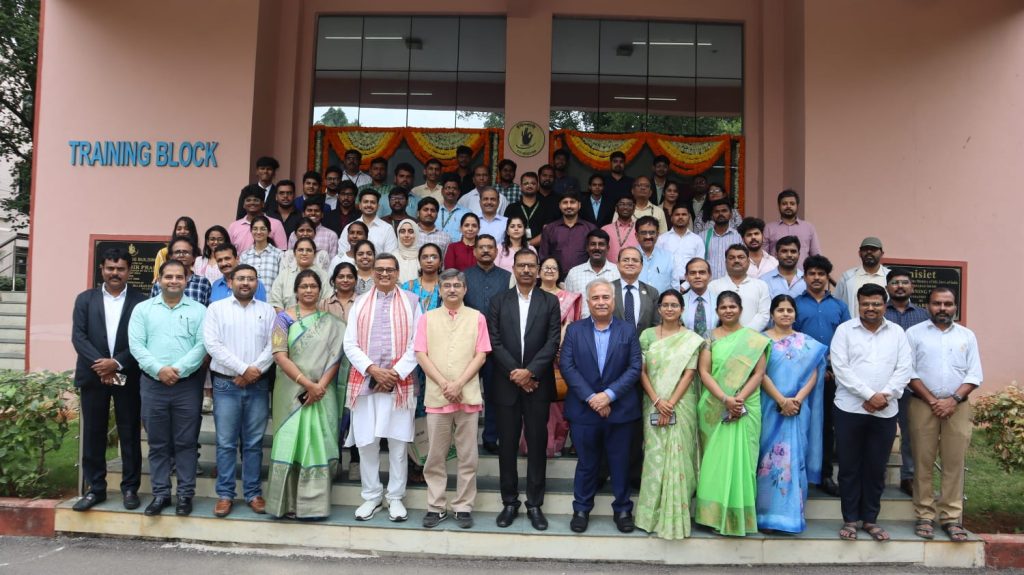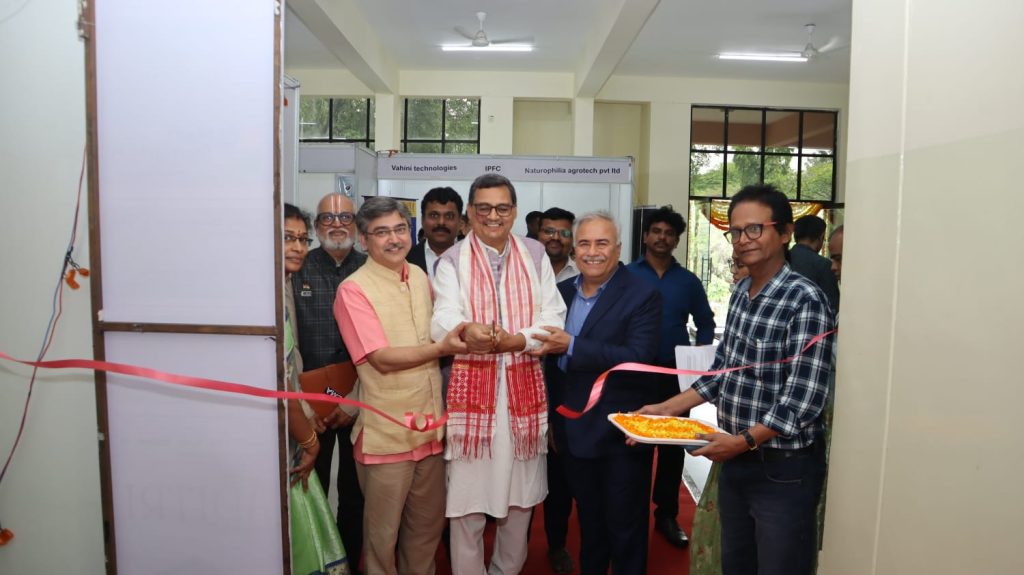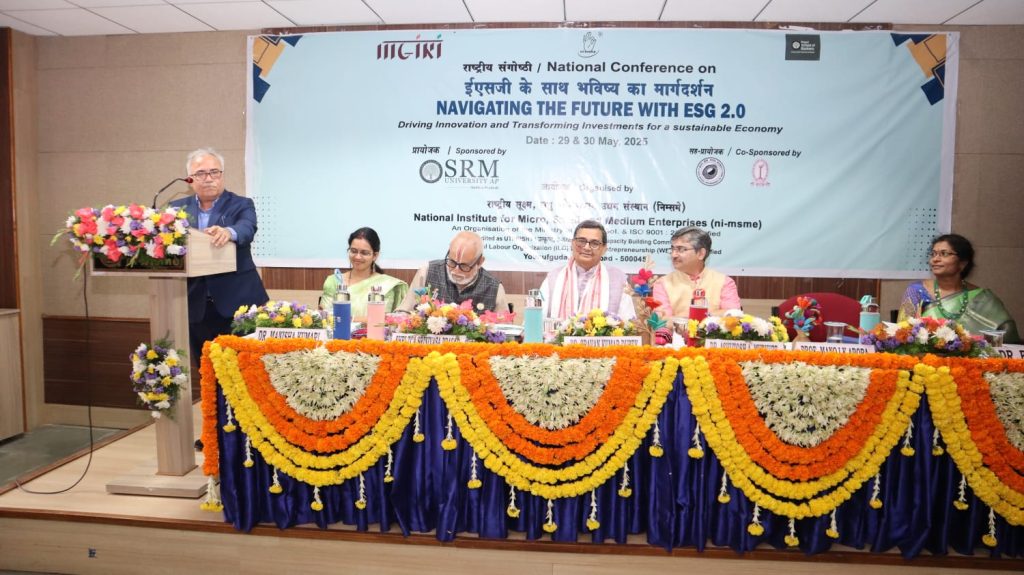- Review of The Bloomsbury Handbook to the Digital Humanities (DH) June 2, 2025
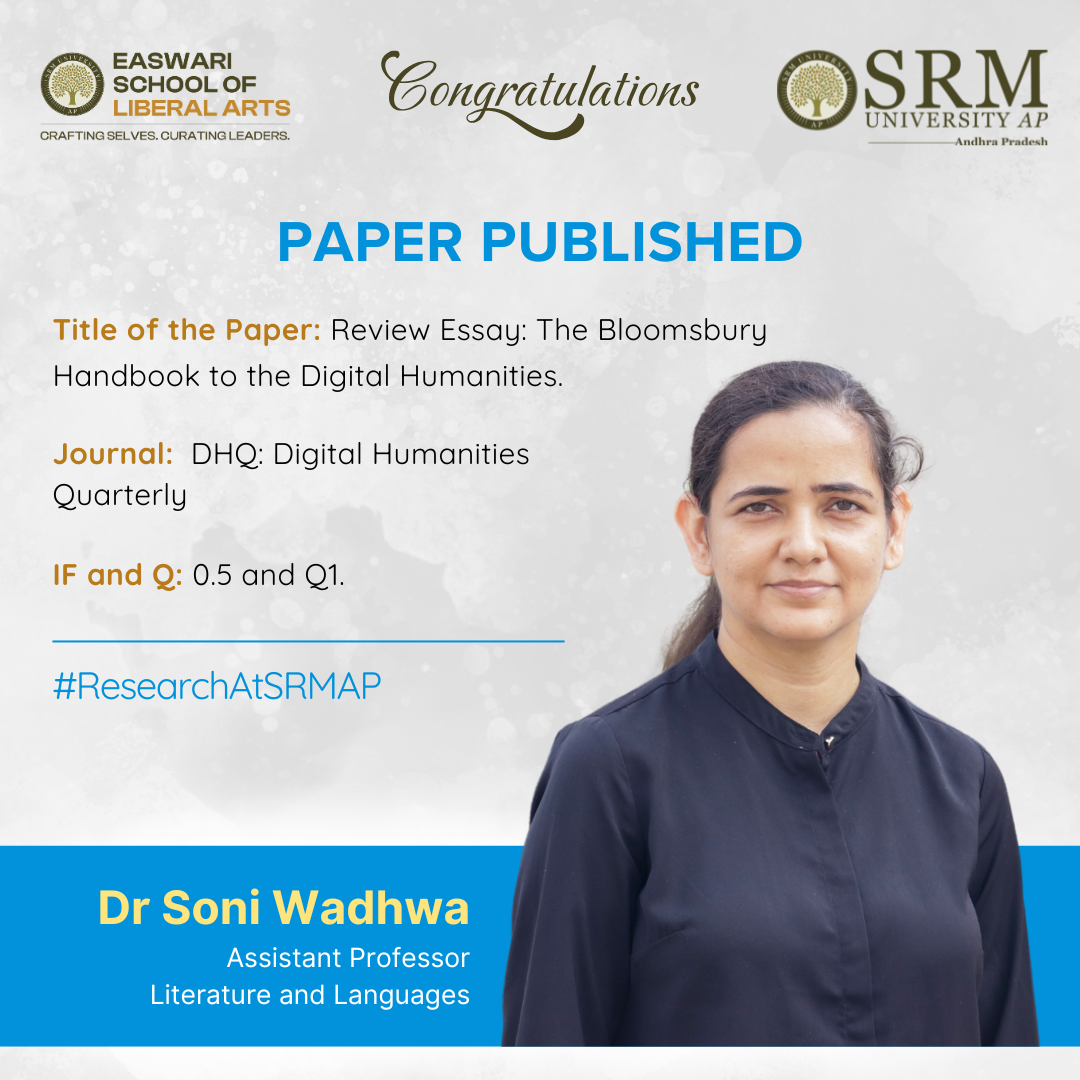 A handbook is a complex and demanding genre, it must offer a comprehensive overview of a field, articulating its foundational principles, charting ongoing debates, and identifying potential future directions. Such volumes are often judged as much by what they exclude as by what they include. Within this context Dr Soni Wadhwa, Assistant Professor in the Department of Literature and Languages, approached “The Bloomsbury Handbook to the Digital Humanities” in her review essay published in the Q1 journal “DHQ: Digital Humanities Quarterly”.
A handbook is a complex and demanding genre, it must offer a comprehensive overview of a field, articulating its foundational principles, charting ongoing debates, and identifying potential future directions. Such volumes are often judged as much by what they exclude as by what they include. Within this context Dr Soni Wadhwa, Assistant Professor in the Department of Literature and Languages, approached “The Bloomsbury Handbook to the Digital Humanities” in her review essay published in the Q1 journal “DHQ: Digital Humanities Quarterly”.Abstract
The Bloomsbury Handbook, edited by James O’Sullivan is framed as a forward-looking resource aimed at fostering further developments in the field of digital humanities (DH). In his introduction, O’Sullivan notes that the volume is designed to serve three categories of readers: DH experts, the DH-curious, and skeptics. The collection is divided into five thematic sections: “Perspectives & Polemics,” “Methods, Tools, & Techniques,” “Public Digital Humanities,” “Institutional Contexts,” and “DH Futures.” Each section features chapters that provide overviews of key subfields while engaging with specific methodological and theoretical issues.
In her review, Dr Wadhwa refrains from summarising all 43 chapters. Instead, she evaluates what the handbook offers to the different categories of readers it aims to serve. She highlights the volume’s self-critical tone and its ability to generate meaningful dialogue about the contributions and challenges of digital humanities in analysing culture and text.
Dr Wadhwa also addresses the misconceptions and hesitations that often surround digital humanities, particularly among scholars from humanities and social sciences who may feel excluded due to a lack of technical expertise. Her review seeks to demystify the field by showcasing exemplary work from leading scholars, thereby offering guidance to researchers interested in exploring DH.
Practical Implementations and Future Research plans:
She hopes that her essay will encourage aspiring researchers to delve deeper into the various subdomains of digital humanities and engage with the field with greater confidence. Dr Wadhwa emphasises the need for more accessible resources and institutional support for digital humanities, asserting its growing relevance within academia.
Looking ahead, she intends to build further on her work in the area of digital archiving which is a vital subdomain within digital humanities. She plans to write more extensively about the projects she has undertaken, contributing to the evolving discourse and practice of the field.
Continue reading → - SRM celebrates Rajitha’s gold in 4x400m relay June 2, 2025
The Hindu
Continue reading →
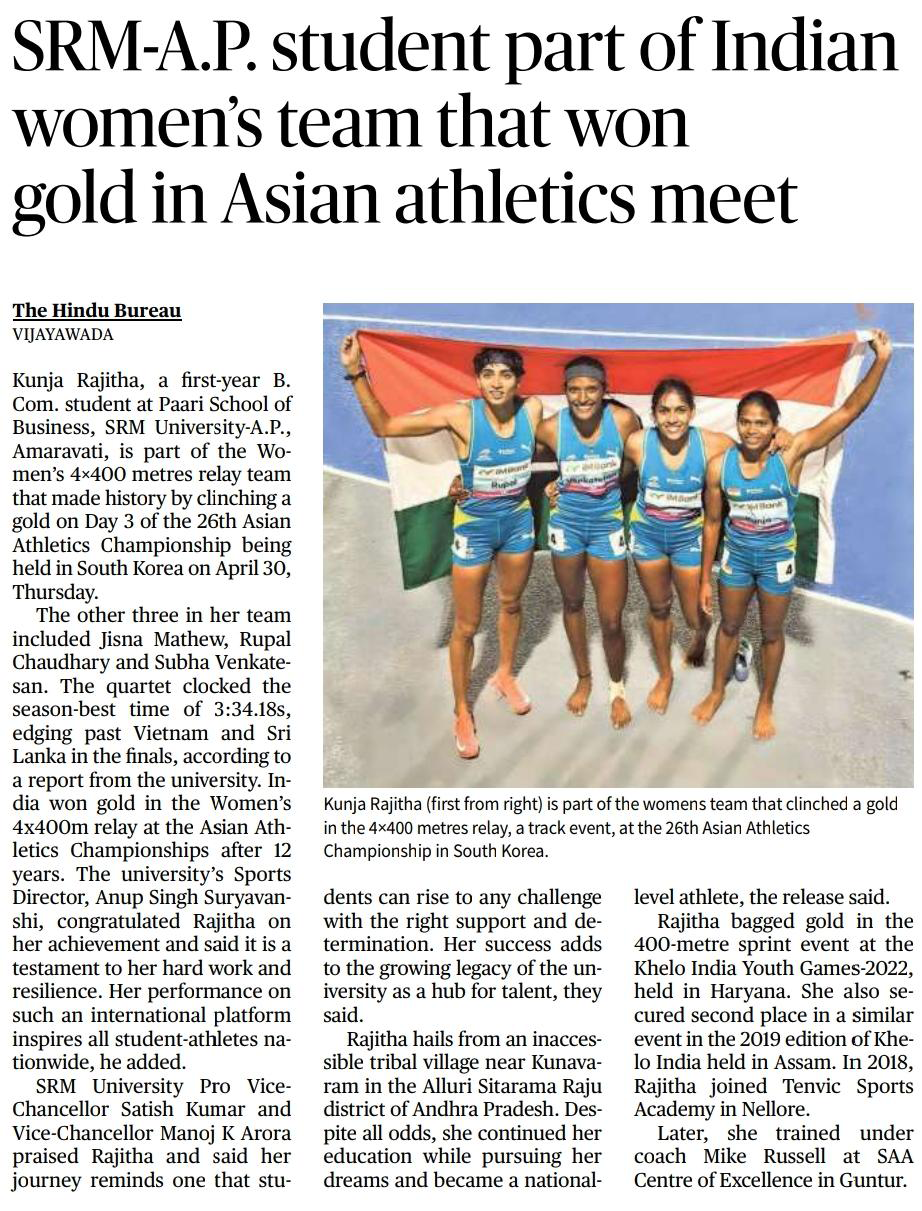
The Pioneer
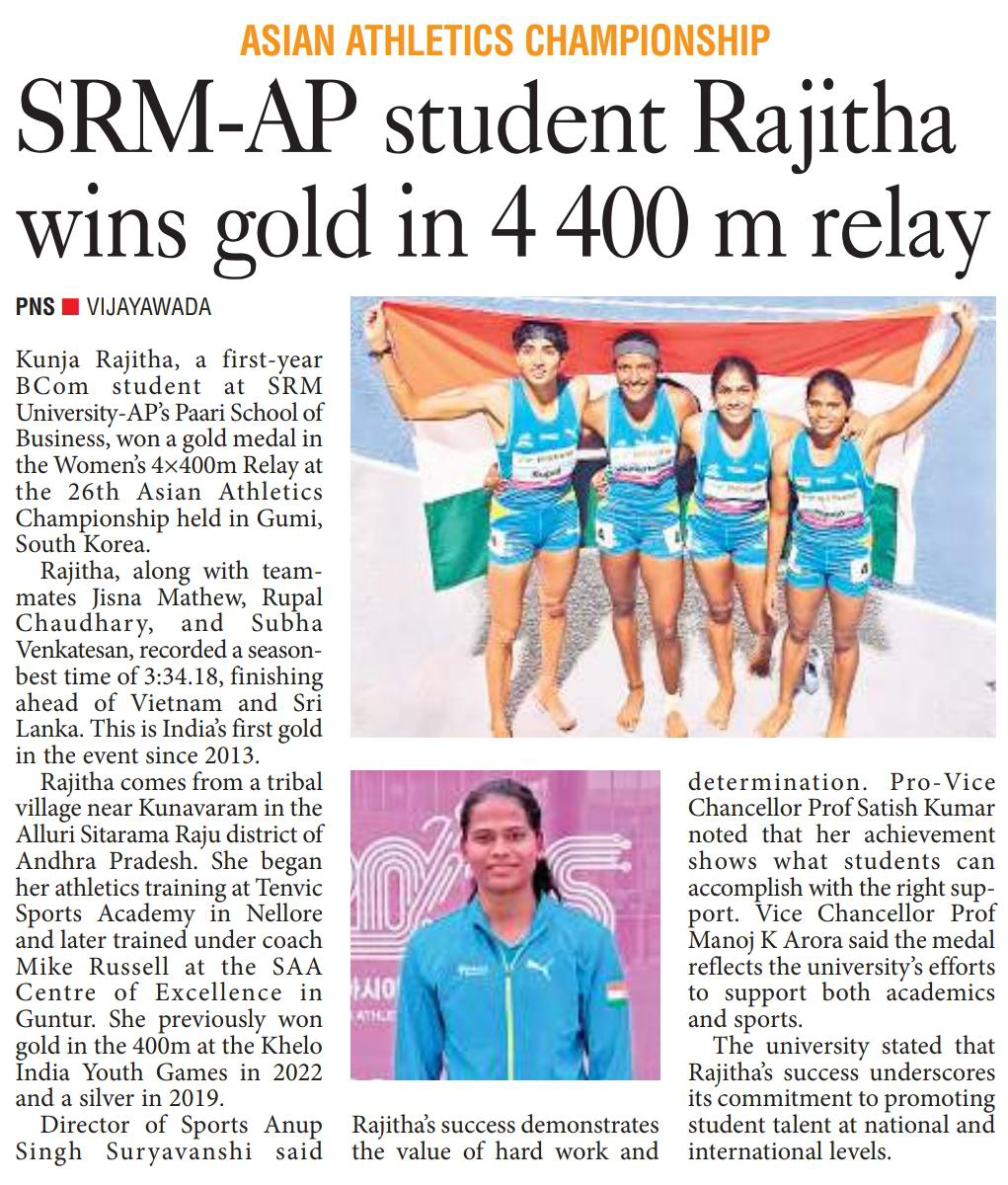
The New India Express
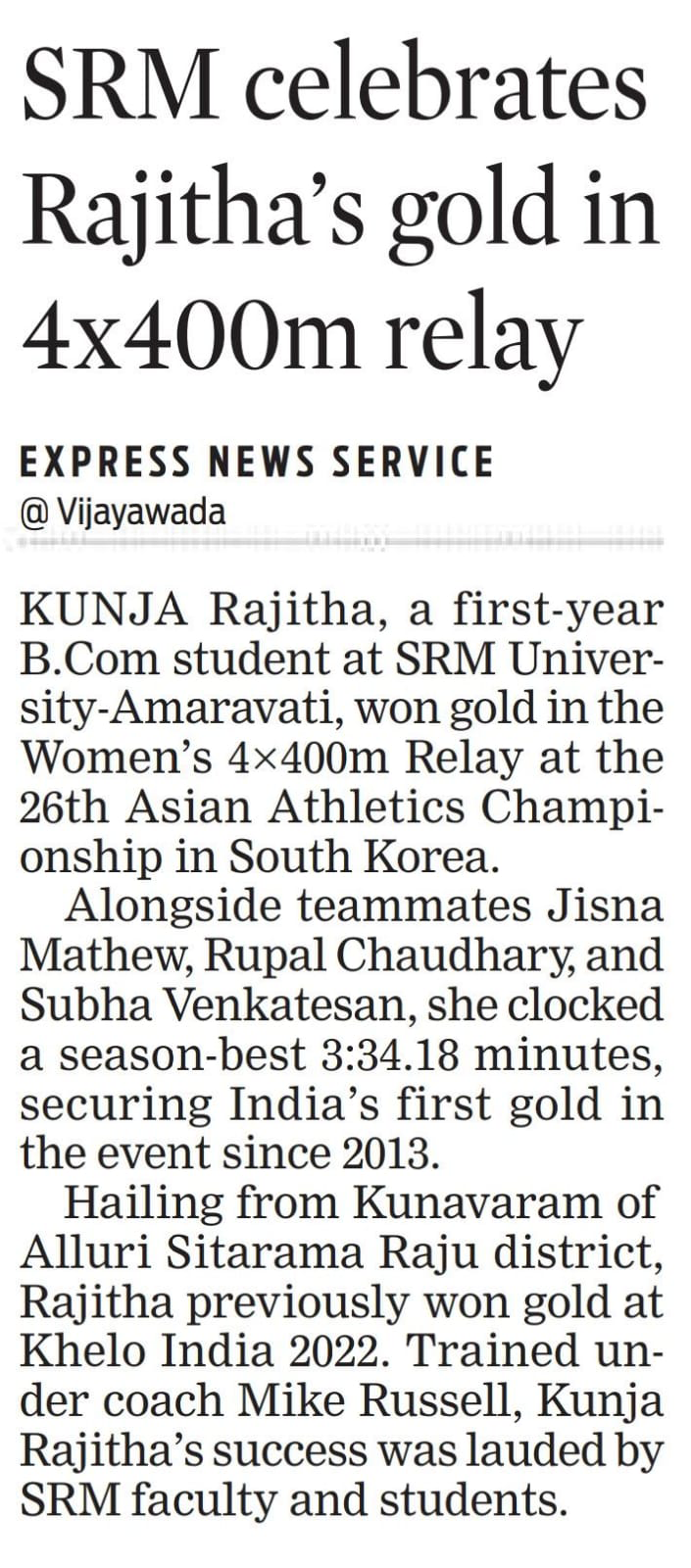
The New Sunday Express
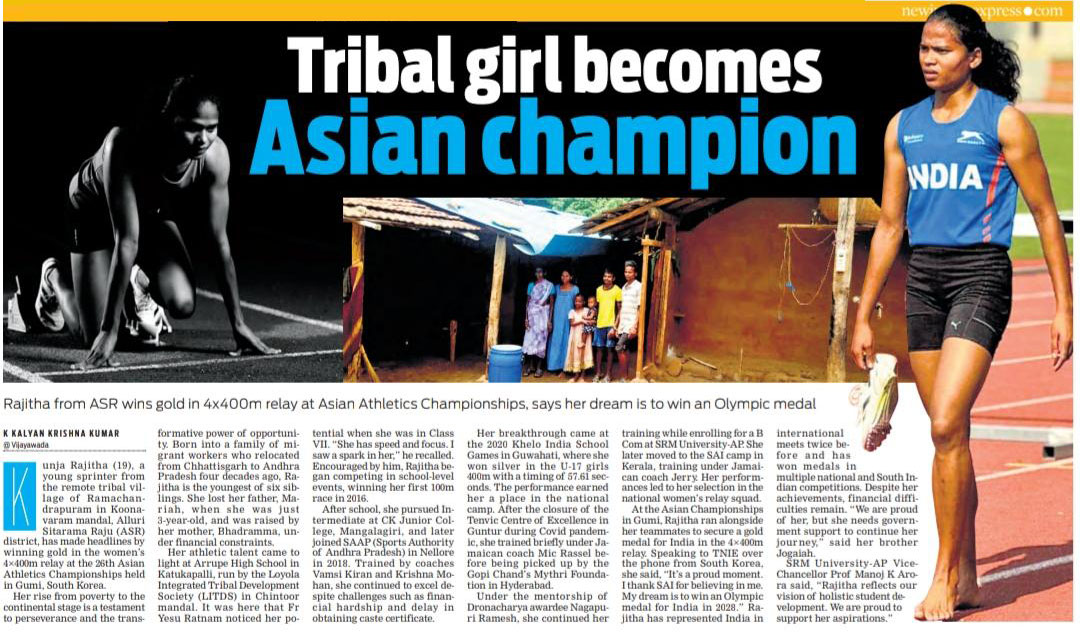
Eenadu
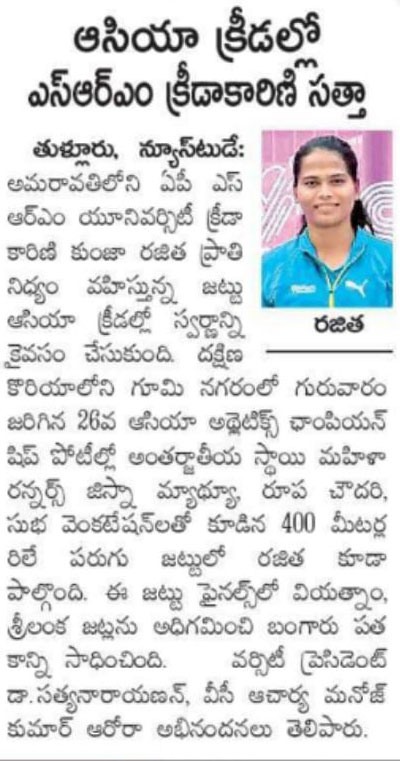
Andhra Patrika
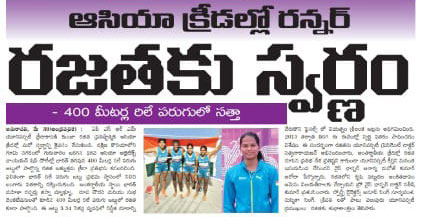
Andhra Jyothi

Surya
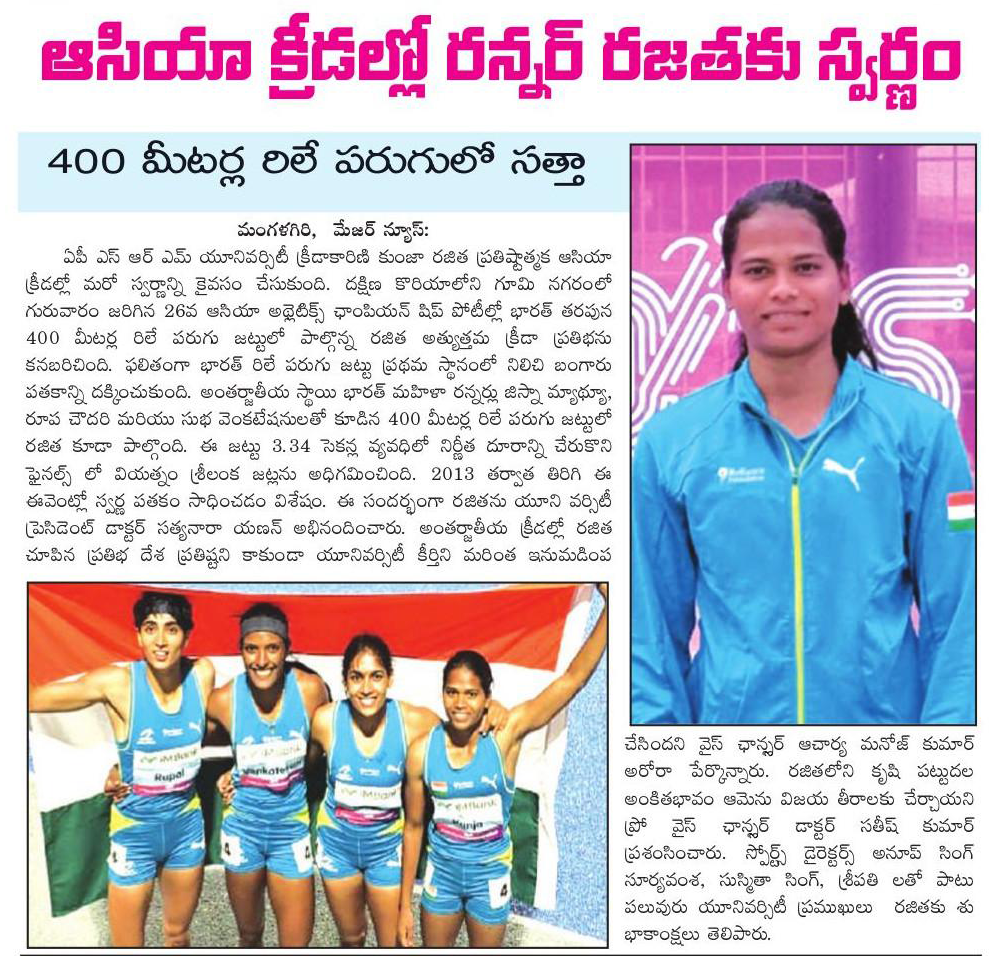
Andhra Prabha
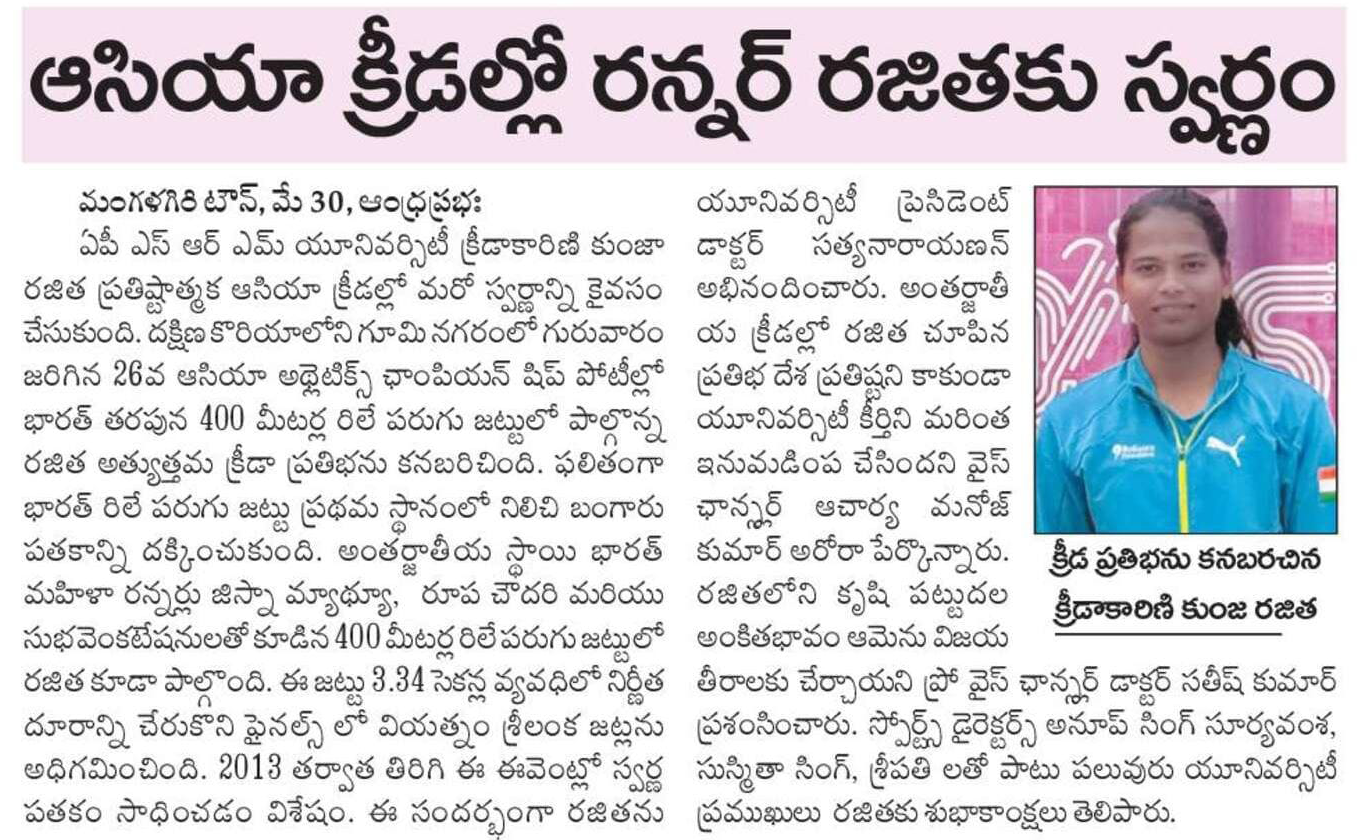
Visalaandhra
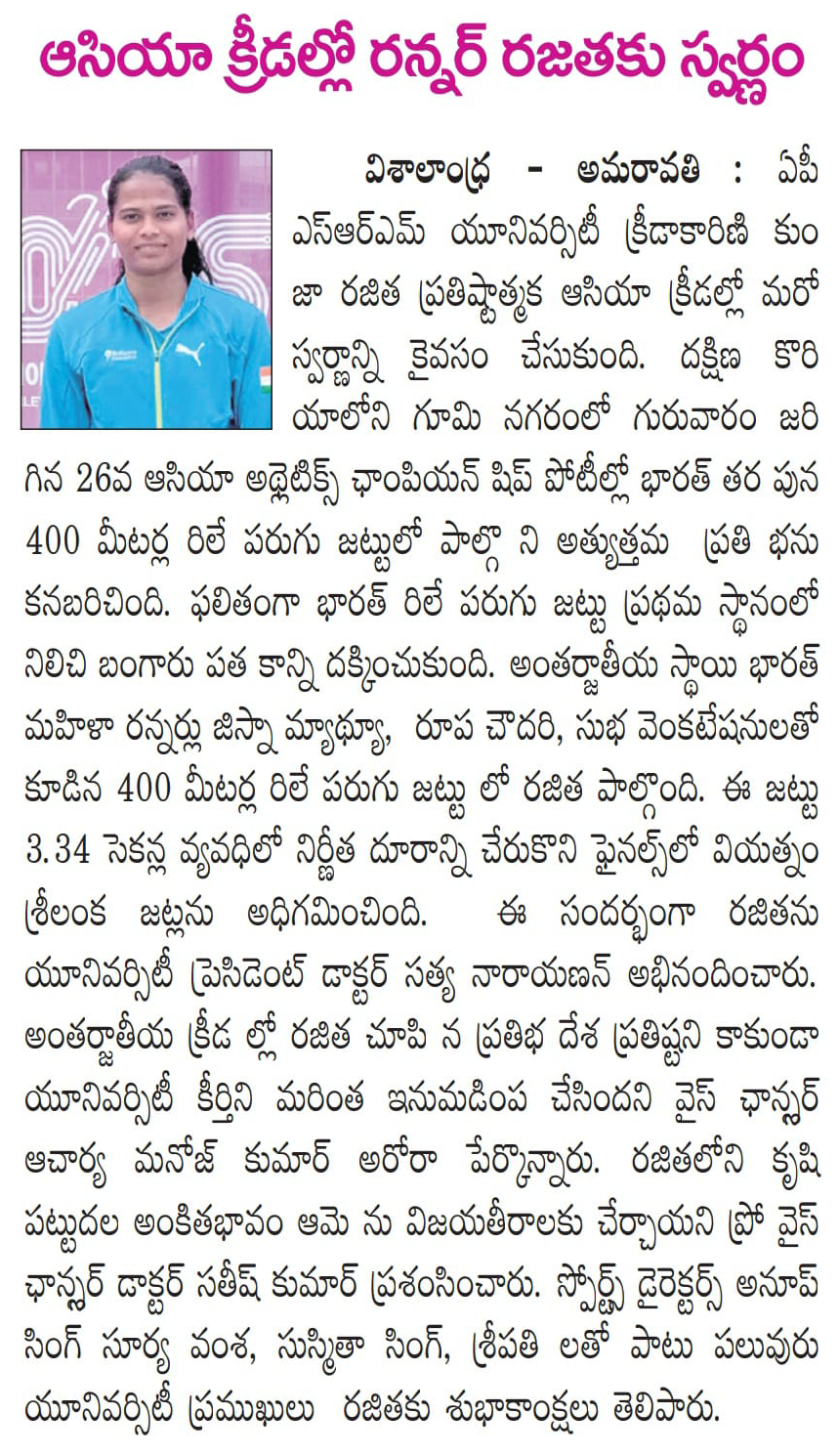
Journalist File
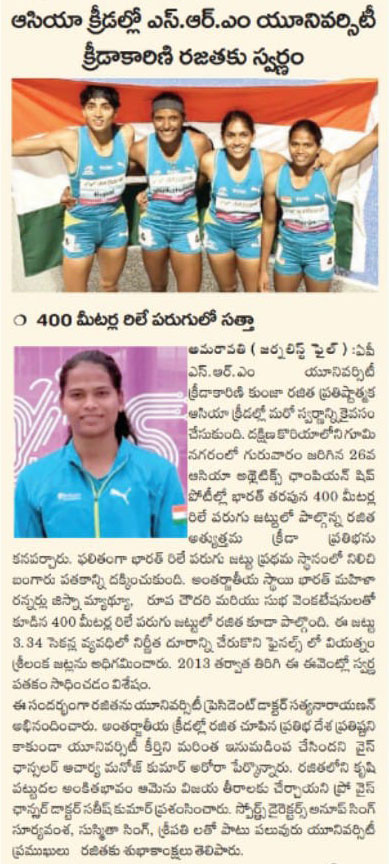
Bhaskar News
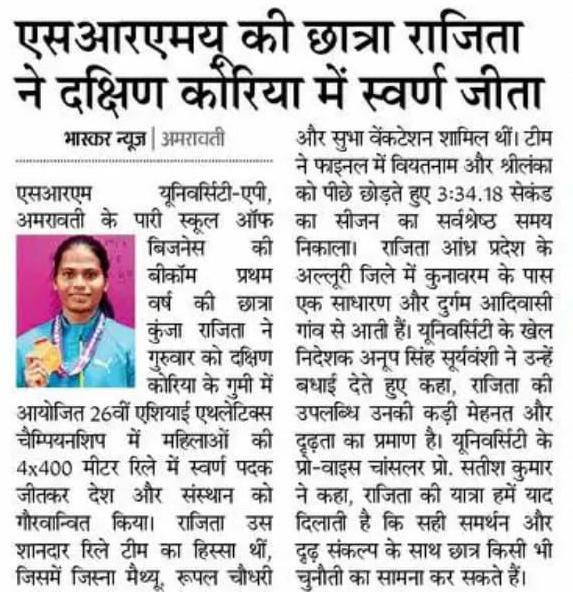
Arth Parkash

- Prof. Manoj K Arora Delivers a Session at the National Conference on ESG 2.0 June 2, 2025
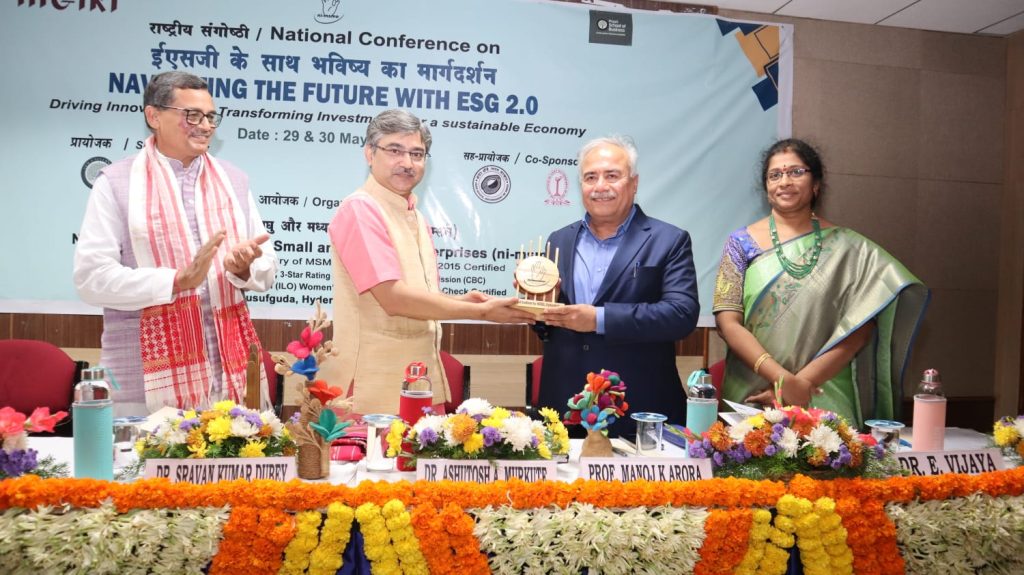
Prof. Manoj K Arora, Vice Chancellor, SRM University-AP, delivered an insightful session at the National Conference on Navigating the Future: ESG 2.0 held on the theme “Advancing Green Finance: Driving Innovations and Transforming Inventions for a Sustainable Economy”. Prof. Arora shared his insights on how ESG principles are seamlessly embedded into the educational landscape. The conference was jointly organised by the National Institute for Micro, Small and Medium Enterprises (ni-msme), FinRise, and Paari School of Business, SRM University-AP.
In his session, Prof. Arora addressed the vital role of Environmental, Social, and Governance (ESG) principles in shaping future-ready educational institutions. He elaborated on how SRM AP is embedding ESG into the five foundational pillars of higher education:
- Transparent and ethical Governance
- Eco-conscious Infrastructure
- Empowered Students, Faculty & Staff
- Value-driven Curricula
- Impactful Research & Innovation
He elaborated on SRM AP’s initiatives, including a Green Campus, SDG-aligned research clusters, a Centre of Excellence in Interdisciplinary Research, and the upcoming Master’s in Environmental and Sustainability Engineering, which is aligned with India’s sustainability goals. This highlighted that SRM AP successfully pursues and achieves sustainable transformation.
At SRM University-AP, Amaravati, education plays a transformative role in fostering environmental stewardship, social responsibility, and ethical leadership. The university strives to build a sustainable tomorrow.
Continue reading → - Kunja Rajitha, SRM-AP’s Trailblazer, Clinches Gold at the 26th Asian Athletics Championship June 2, 2025
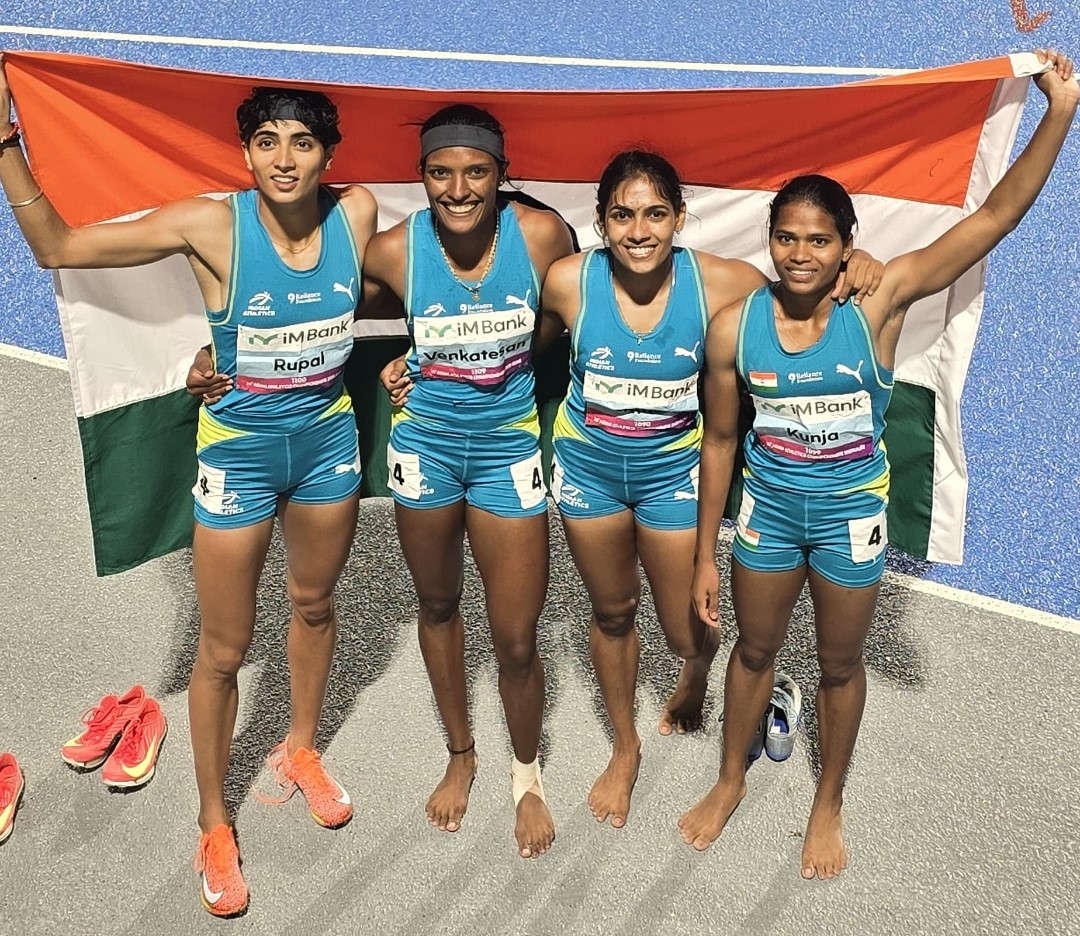 Ms Kunja Rajitha, a first-year B.Com. student at Paari School of Business, SRM University-AP, Amaravati, brought immense pride to the nation and the institution by clinching a Gold Medal in the Women’s 4×400m Relay at the 26th Asian Athletics Championship held at Gumi, South Korea, on Thursday.
Ms Kunja Rajitha, a first-year B.Com. student at Paari School of Business, SRM University-AP, Amaravati, brought immense pride to the nation and the institution by clinching a Gold Medal in the Women’s 4×400m Relay at the 26th Asian Athletics Championship held at Gumi, South Korea, on Thursday.Rajitha was part of the formidable relay team, which included Jisna Mathew, Rupal Chaudhary, and Subha Venkatesan. The team delivered a season-best time of 3:34.18s, edging past Vietnam and Srilanka in the finals. This victory marks a historic comeback for India, earning the first gold in this event since 2013, ending a 12-year wait.
Mr Anup Singh Suryavanshi, Director – Sports, SRM University-AP, congratulated her, saying, “Rajitha’s achievement is a testament to her hard work and resilience. Her performance on such a prestigious international platform inspires all student-athletes nationwide. Competing and winning at the Asian level reflects the caliber of talent we are proud to nurture at SRM University-AP.”
Prof Satish Kumar, Pro-Vice Chancellor of SRM University-AP, said, “ Rajitha’s journey reminds us that students can rise to any challenge with the right support and determination. Her dedication, perseverance, and success embody the spirit of excellence we strive to cultivate in the students here at our varsity. Her success adds to the growing legacy of SRM University-AP as a hub for emerging talent and global achievers.”
Prof Manoj K Arora, Vice Chancellor of SRM University-AP, also lauded her win, saying, ” This victory is not just a personal milestone in Rajitha’s career but also a significant achievement celebrated by all of us here who have followed and supported her progress. Her gold medal win reinforces our vision of holistic student development. We take extreme pride in her success and look forward to many more such triumphs.”
Kunja Rajitha hails from a humble and inaccessible tribal village near Kunavaram in the Alluri district of Andhra Pradesh state. Despite all odds, she continued her education while pursuing her dream and became a national-level athlete. Rajitha bagged gold in the 400-metre sprint event at the Khelo India Youth Games-2022, held in Haryana. She also secured second place in a similar event in the 2019 edition of Khelo India held in Assam. In 2018, Rajitha joined Tenvic Sports Academy in Nellore. Later, she trained under coach Mike Russell at SAA Centre of Excellence in Guntur.
Rajitha’s remarkable achievement reflects SRM University-AP’s unwavering commitment to fostering the overall development, where students are encouraged to pursue excellence in sports alongside academics on both national and international platforms.
Continue reading → - BSc Chemistry Student Secures Prestigious IASc-INSA-NASI Summer Research Fellowship 2025 May 30, 2025
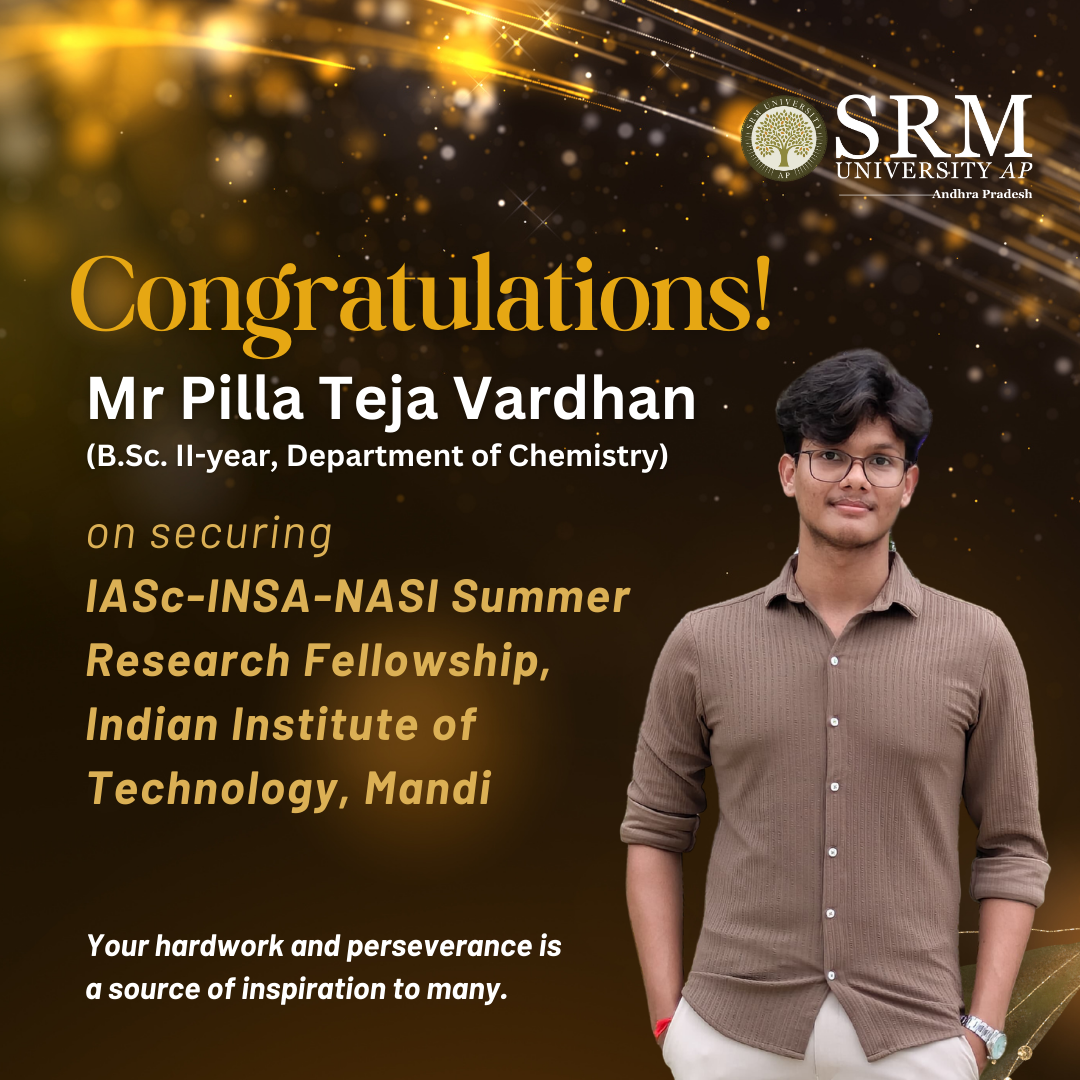 Mr Pilla Teja Vardhan, a second-year B.Sc. Chemistry student, has been selected for the highly prestigious IASc-INSA-NASI Summer Research Fellowship 2025. This esteemed fellowship is jointly offered by the Indian Academy of Sciences (IASc), Indian National Science Academy (INSA), and The National Academy of Sciences, India (NASI) India’s premier scientific institutions committed to nurturing research talent across the country.
Mr Pilla Teja Vardhan, a second-year B.Sc. Chemistry student, has been selected for the highly prestigious IASc-INSA-NASI Summer Research Fellowship 2025. This esteemed fellowship is jointly offered by the Indian Academy of Sciences (IASc), Indian National Science Academy (INSA), and The National Academy of Sciences, India (NASI) India’s premier scientific institutions committed to nurturing research talent across the country.As part of this elite program, Teja Vardhan will spend eight weeks at the Indian Institute of Technology (IIT), Mandi, under the expert mentorship of Dr Amit Jaiswal, engaging in cutting-edge research in the field of Nanomatter and advanced material chemistry. This opportunity will enable him to gain valuable hands-on research experience, deepen his scientific insight, and contribute to ongoing investigations in frontier areas of science.
The IASc-INSA-NASI Summer Research Fellowship is known for its rigorous selection process and generous support. Selected students receive a monthly stipend of ₹12,500. The fellowship ensures a fully supported and immersive research experience at some of India’s leading scientific institutions.
About the Fellowship
Continue reading →
The IASc-INSA-NASI Summer Research Fellowship Program is one of India’s most competitive undergraduate research initiatives, designed to provide meritorious students with exposure to advanced scientific research. Fellows work closely with leading researchers across academic and national laboratories, fostering a strong foundation for future scientific careers.


